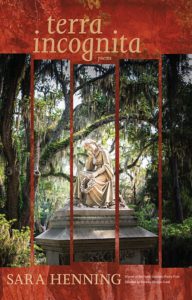 Review by Christine Stewart-Nuñez
Review by Christine Stewart-Nuñez
Terra Incognita follows Sara Henning’s much-lauded View from True North, co-winner of the 2017 Crab Orchard Series in Poetry Open Competition Award and the 2019 High Plains Book Award. In her second collection, winner of the Hollis Summers Poetry Prize, Henning offers the transformational knowledge of how grief drops into our bodies, reframes our memories, and binds us to our lost beloveds. And she does so with exquisite wordcraft that harnesses our emotions. I highly recommend this book for a range of readers: those who already love poetry, and those who would benefit from this gorgeous invitation to consider love and loss.
This gorgeous book flows from the opening line of the first poem: “When my mother died…” From the point of view of losing her mother to cancer, even a childhood memory of pleasure—eating saltwater taffy in Savannah—stories grief. In another poem, recollection of her mother frying eggs shimmers to new knowledge:
“ —two martyrs cracked open, their future
braised slow. Years later, I’m still fork-deep
in awakening. She’s dead, and no one can teach me
to pierce the grief, to catch its trigger of salt.” (9)
The stark beauty rendered in such a simple act of cooking illuminates the mother-daughter relationship. We understand it as nurturing yet unpretentious. Henning seizes the essence of their bond at the poem’s end by naming the impossibility of recreating her mother’s presence: “How she loved me. / I fry my eggs as if I can taste her, savor what I / can scrape: I eat my failing. I kill the heat” (9). In the longing, we understand the daughter’s returned love for her mother.
Throughout the book, Henning depicts their relationship in sharp fragments—child’s head pressed to her mother’s hip as her mother leads the pair through smashed glass in the street; the mother smoking in the car; the mother cutting the umbilical cords of kittens birthed in their home. These details resist the glossy veneer of sentiment, which can be a danger with poems of loss; instead of telling us how to feel, they persuade us viscerally. For example, “Still Life with Smoke” opens with the speaker declaring that her “heart is hijacked/ by menthol, my mother’s hoodoo” (31). Scent creates such a grip on memory that I, despite not knowing anyone who smokes menthol cigarettes, immediately gasped. I do know the experience of scent becoming “a satin siren, an effigy stretching / its lost body through my lungs” (31). And yet in these poems, scent can evoke another kind of visceral response, equally powerful in its specificity.
Henning writes that in the last visit, “I could smell // her tumors ulcerating, that honey-/
crust stink of a wound already // damned” (32).
Throughout Terra Incognita, Henning uses form in stunning ways. On a first read of “Terra Nova,” an accomplished sonnet sequence found at the heart of the book, I sensed the constraints before I could name them. Goosebumps. And like embarking on a route I know well, I begin to anticipate landmarks: turns, refrains, sonic patterns. Every time Henning transformed a closing line into an opening one, she dazzled with finesse, moving readers in and out of time, memory, and imagery: “pity her story until another genre explodes” becomes “Pity her story, its genre exploding” (41). “In her end is my beginning” becomes “Begin me, IV drip of morphine” (42-43), the latter of which initiates a sectional anaphora:
“Begin me, Penguins winning the series 4-2.
Begin me, liver necrosis dropping its gloves,
hoisting her past the final scrimmage. My mother, the trophy
refracting. Begin me, circle that will not end.
Begin me, wound never closing.” (43)
Henning negotiates the rules to surprise and challenge, opening up the process of grief. The effect of her artistry is depth in all areas of craft, creating a scaffold to hold her grief as well as hold ours too. The lines from the villanelle “Terra Firma” feel etched on my body:
“What is pain but a story of mercy? It lingers
in my blood. All things end to end again.
I sink my heels into darkness, that silk tether.
It hurts like hell to bury your mother.” (49)
Rebecca Morgan Frank, the Hollis Summers Poetry Prize judge, called Terra Incognita “searing” and “fierce,” words that will surface for any reader. We see how grief ripples out, all the speaker’s other loves thrown into relief by is power—a lost pregnancy, husband’s health scare. But the work itself doesn’t leave us in despair or fear; Terra Incognita’s power resides in Henning’s testimony to love and how love that endures.
Terra Incognita by Sara Henning
Ohio University Press, 2022,
$17.95 ISBN: 9780821424759
Christine Stewart-Nuñez is the author of The Poet & The Architect (2021), Untrussed (2016) and Bluewords Greening (2016) —winner of the 2018 Whirling Prize (literature of disability theme). Her debut prose collection, Chrysopoeia: Essays of Language, Love, and Place, is forthcoming from Stephen F. Austin Press in 2022. Her work has been the basis for international, cross-artistic collaborations with colleagues in music, dance, visual art, and architecture. Christine served as South Dakota’s poet laureate from 2019-2021. She teaches in the women’s and gender studies program at the University of Manitoba. christinestewartnunez.com.
